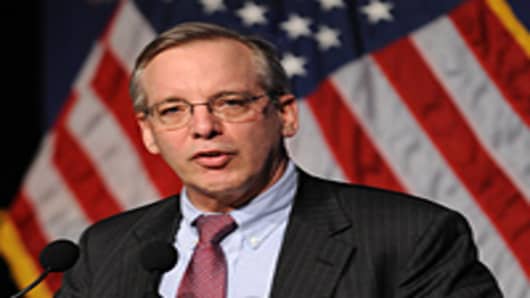Federal Reserve Bank of New York President Bill Dudley, a leading dove on the Federal Open Market Committee, sounding a somewhat hawkish tone in an exclusive CNBC interview, suggested he does not at the moment see a need for additional easing from the central bank.
“My view is that, if we continue to see improvement in the economy, in terms of using up the slack in available resources, then I think it's hard to argue that we absolutely must do something more in terms of the monetary policy front,” Dudley said.
The New York Fed chief, who has a permanent vote on the rate-setting FOMC, acknowledged that his views have hardened a bit from his more dovish comments a year ago.
“What's changed for me…is that I'm a little bit more confident that the economy's going to keep growing,” he said. “I'm a little bit less worried about a Japanese-style deflation outcome. And that was really the reason that, for me personally, motivated the need for further monetary policy action.”
But Dudley was not reluctant to say he would support additional action by the Fed if the economy or job growth falters or inflation fell.
“If downside risks from, say, Europe or the U.S. fiscal cliff were to really intensify, then I think you'd absolutely have to consider further monetary policy moves,” he said.
Dudley said he would attend the critical FOMC meeting in June with an open mind, but appeared to lean toward letting "Operation Twist"expire without another program to take its place.
“The best outcome would be the economy looks good, downside risks diminish, inflation is stable,” he said. “You know, if that were the case, I would presume that we would keep policy on hold.
Dudley also offered some of the first comments from a Fed official on the massive JPMorgan Chasederivatives losses, saying the central bank would “look at it very closely to see, exactly what's happened there” as part of its supervision.
He also defended the Fed against criticism that its supervisors had missed the risky trades on the books of the banking giant.
“Supervision is about ensuring that banks have sufficient capital and liquidity to handle large shocks. It's about ensuring that they have appropriate governance, controls, and risk management systems in place,” he said. “It's not to prevent the banks from making mistakes, in any dimension.”
Dudley sees the economy growing at a tepid 2.4 percent, about in line with private sector forecasters. He called the gradual growth “pretty disappointing” and said the U.S. economy could produce 300,000 jobs a month for a year or more without worries about inflation. He believes some unknown part of the stronger 200,000 job growth earlier this year was the result of historically mild winter weather.
Among the headwinds that concern him are the so-called “fiscal cliff” in which government spending is set to drop sharply at the end of the year and taxes to rise, and the ongoing financial crisis in Europe, which could hurt the U.S. either from weak growth or contagion in the financial system. While Dudley suggested that U.S. banks have limited their exposure to the continent, he said it could still have a negative effect.
“If the situation in Europe got bad enough and broad enough, there would be consequences back to the U.S. banking system,” he said. “All we can do is make sure that the U.S. banking system is in a situation where it has capital and liquidity resources, so they can handle significant shocks.”
Dudley called the fiscal cliff “a big concern ... that could be a huge shock to an economy that isn’t that strong yet.” He urged lawmakers to agree to a long-term deficit-reduction program “that starts slowly and builds over time.” Dudley added that there are limits to how much monetary policy can do.
Dudley is set to give a speech this afternoon on monetary policy rules, in which he’ll argue that rules can be helpful in communicating with markets but that he would “be very hesitant to apply them mechanically.”
—By CNBC's Steve Liesman




